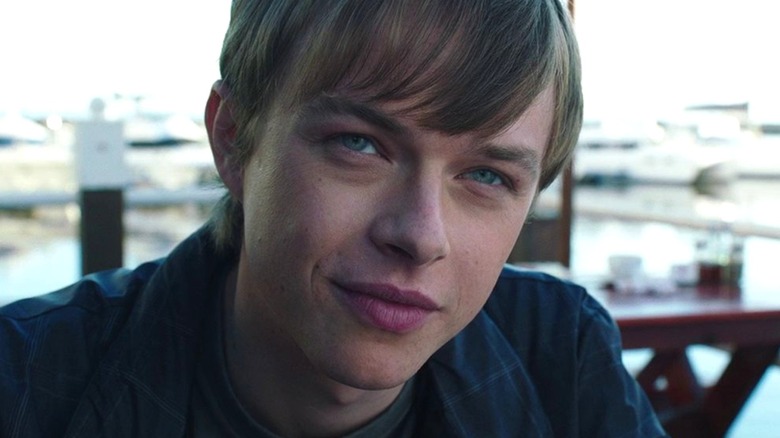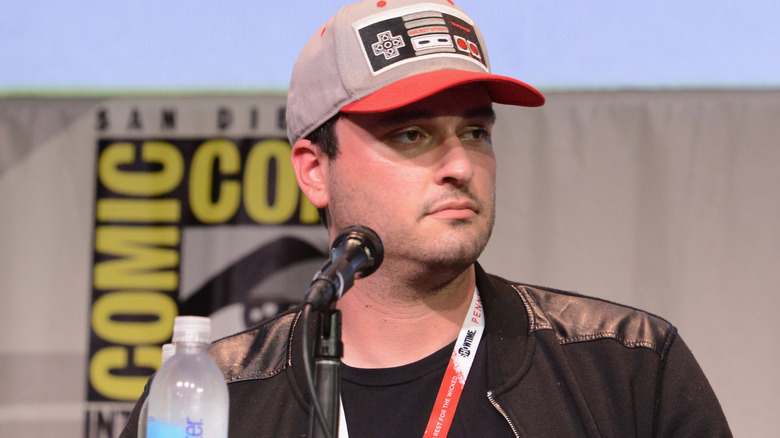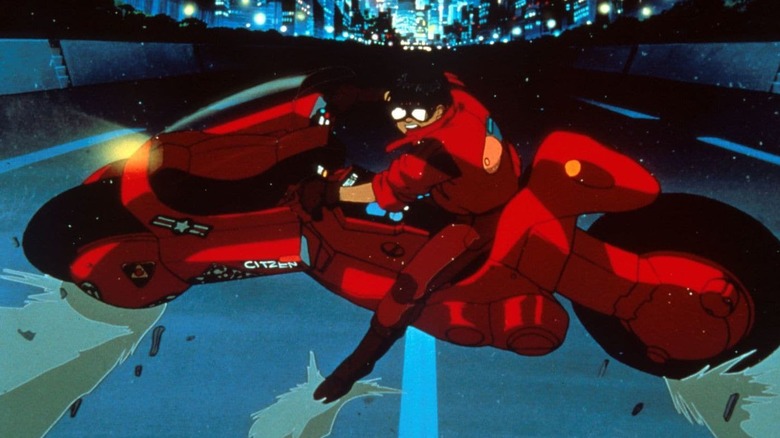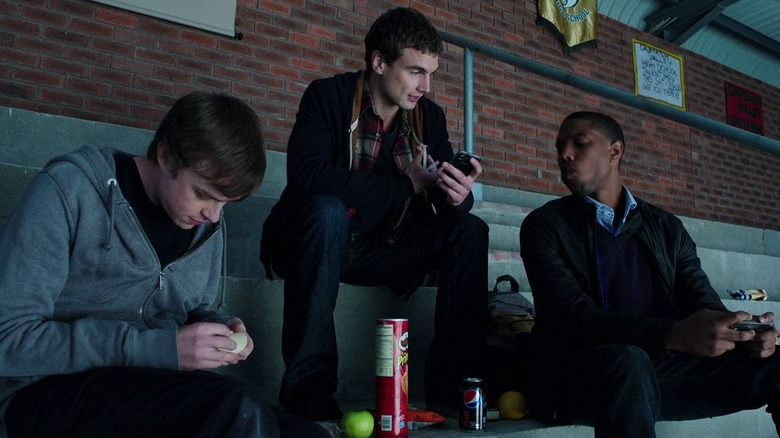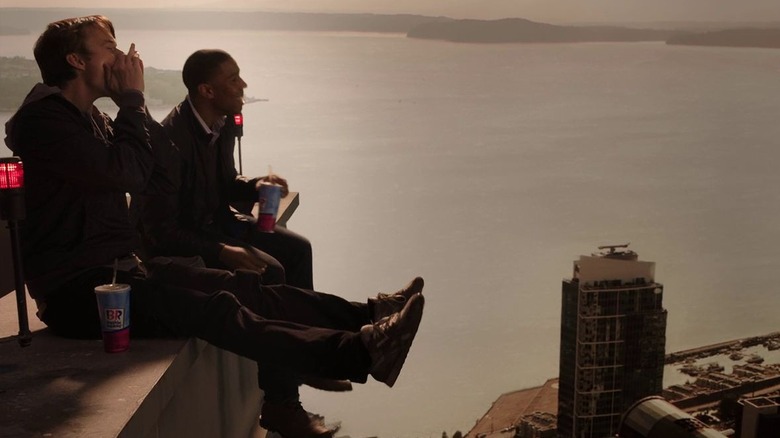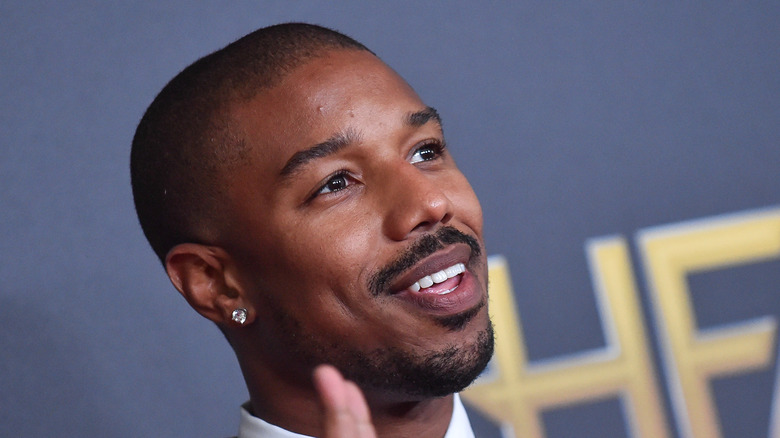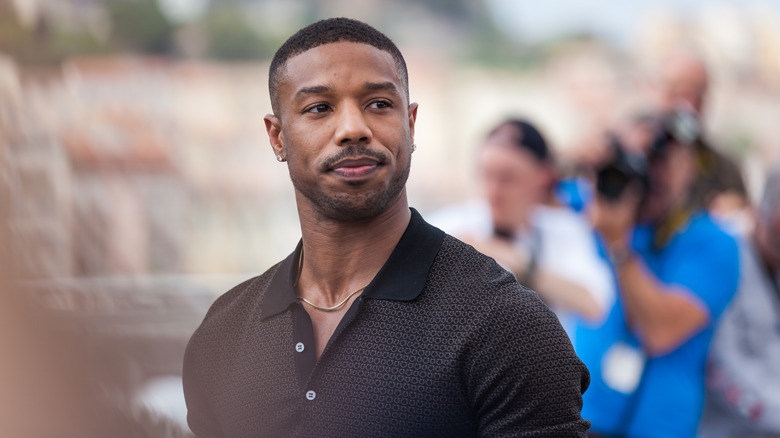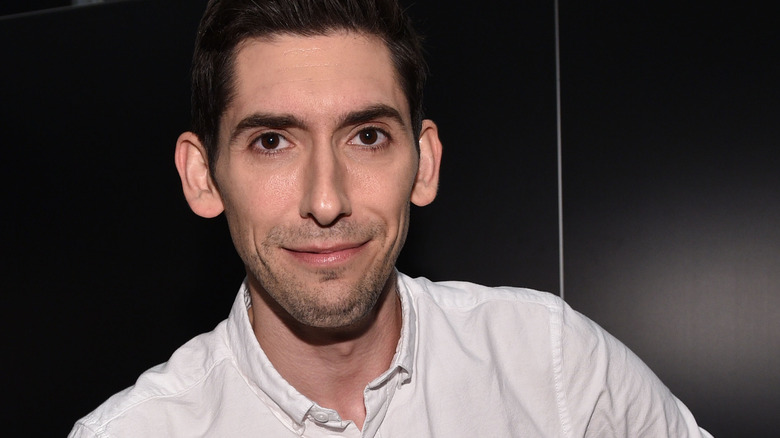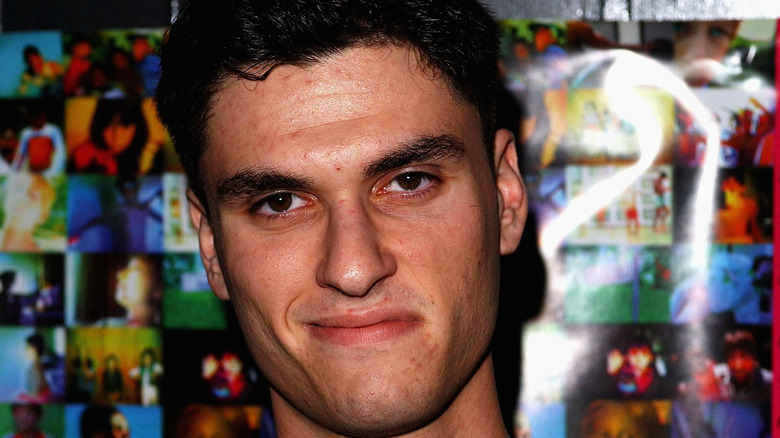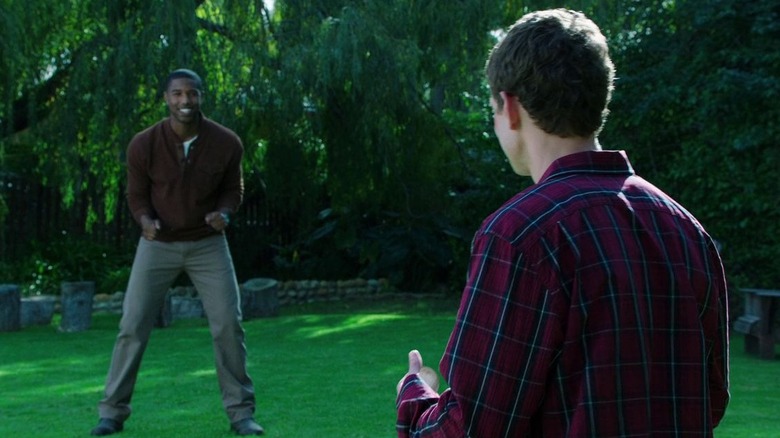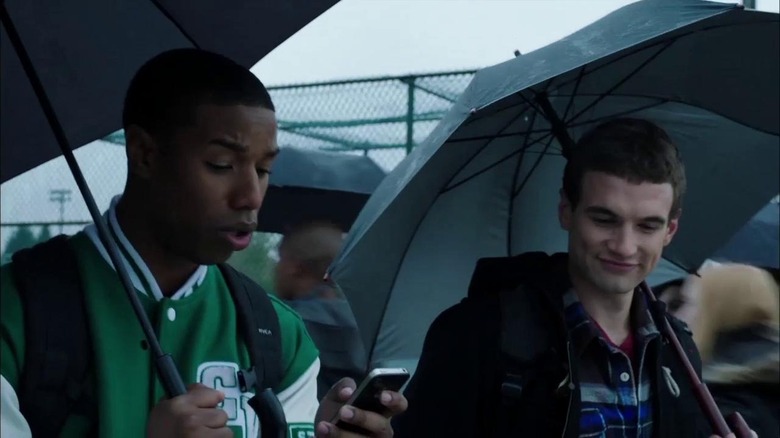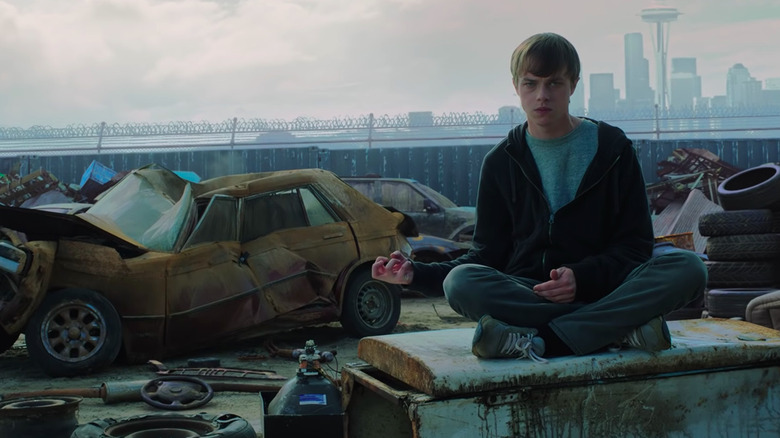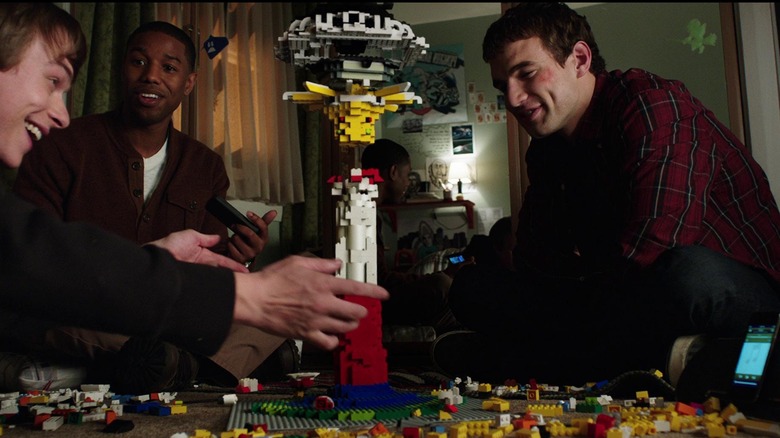The Untold Truth Of Chronicle
Debuting in theaters in February 2012, "Chronicle" was not a total revelation to moviegoers in terms of its camerawork. Told through the found-footage method of filming, "Chronicle" was one of many titles in this subgenre dominating movie theater screens in the early years of the 2010s.
However, applying this method to a story of teenage superheroes, not to mention taking a grounded approach to chronicling the exploits of a tormented teenager, were novel elements. These unique details, as well as other positive attributes of the project, led to the film scoring critical and financial success once it was released. Though the found-footage craze dwindled out shortly after 2012, "Chronicle's" influence on broad pop culture continued in the years afterward and was felt on movies ranging from "Project Almanac" to the 2017 "Power Rangers" reboot.
Given the ubiquity of this production, it's easy to imagine that fans are aware of everything you could know about this directorial debut from Josh Trank. However, the untold truth of "Chronicle" is jam-packed with obscure and fascinating details that speak to the unique creative process that produced such a distinctive take on the superhero movie. Whether it's where Trank originally came up with this film's story, the casting process for "Chronicle," or the attempts to make a sequel, among many other elements, the untold truth of "Chronicle" is just as captivating as the motion picture itself.
When did Josh Trank come up with the idea for Chronicle?
Part of what made "Chronicle" so appealing was how original it was. Though rooted in influences from pop culture of the past, it was unique among live-action movies of the modern era, especially among superhero fare. Given how idiosyncratic it was, it begs the question of where the plot of "Chronicle" even came from. Fittingly, given the high school ages of its protagonists, "Chronicle" had its roots in high school, as Trank was still a student when he first came up with the story.
In an interview with Polygon, Trank divulged the plot came to him when he was a teenager in high school, although fellow screenwriter Jeremy Slater helped get the concept fleshed out into a functioning screenplay. In a separate interview with IndieWire, Trank further revealed that the high school influences on the production extended to the character of Matt, who the filmmaker saw being most indicative of who he was in his school years. With the project rooted so much in Trank's high school days, is it any wonder "Chronicle" attracted so many younger viewers, as noted by CNN, during its initial theatrical run?
The primary influences on Chronicle
Though "Chronicle" was a hit movie despite not being based on any previously existing intellectual property, that doesn't mean the project was devoid of influences from classic pieces of pop culture. Talking to Gizmodo, Josh Trank broke down some of the biggest influencers on "Chronicle," which turned out to be "Akira," "Carrie," and "The Fury." For Trank, the biggest projects that "Chronicle" was influenced by all shared the common denominator of emphasizing the perspectives and anguish of being a teenager.
The manifestations of other pieces of art in "Chronicle" also took on explicit shades in some cases, Trank noted in the Gizmodo interview. Trank was also influenced by how often the teenager version of himself and his friends would reference pop culture in the way that the protagonists of "Chronicle" would also nod towards famous pieces of pop culture when taking their superpowers out for a spin.
However, Trank also emphasized that he made sure not to overdo these details out of fear of distracting from the standalone story he wanted to tell. By going down this route, "Chronicle" could maintain its original creative spirit while also paying tribute to classic pieces of pop culture that lent an empathetic lens to the perspective of troubled teens.
The difficulties in getting Chronicle off the ground
Every movie is a challenge to turn into a reality. Whatever you're watching on a movie theater screen or Netflix, no matter how bad or good it may be, it took years of effort and the combined hard work of hundreds of human beings to realize. The inherent hurdles in getting any screenplay turned into a fully completed motion picture are reflected in Josh Trank's problems in getting "Chronicle" off the ground. The issues for this project were exacerbated by the fact that "Chronicle" was a completely original property, and there was no famous source material to support its existence.
Talking to Complex, Josh Trank noted that additional problems came from how "Chronicle" was his first-ever feature-length directorial effort. Beyond that, he and the other key creative participants were extremely young. Though these inherent problems didn't disappear once the film was purchased, Trank did observe that 20th Century Fox bought the screenplay for "Chronicle" conscious of these obstacles and was excited about working with a fresh face in the filmmaking field. That response from studio executives helped ease Trank's mind over the avalanche of difficulties that initially surrounded the "Chronicle" screenplay.
What guided the casting of Chronicle?
In the years since "Chronicle" premiered, two of its main actors have become familiar faces to movie fans. Dane DeHaan, after playing this film's antagonist, went on to portray Harry Osborne in "The Amazing Spider-Man 2" before headlining other genre movies like "A Cure for Wellness" and "Valerian and the City of a Thousand Planets." And then there's Michael B. Jordan, who, just one year after "Chronicle," would send his career skyrocketing with an acclaimed lead role in "Fruitvale Station." From there, it was just a hop and a skip for Jordan to headline further beloved features ranging from "Creed" to "Black Panther."
In hindsight, casting future mega-stars like these two seems obvious. However, talking to Complex, Trank revealed that it was a lengthy process to nail down who they wanted to be in the cast. The guiding principle the director stuck with was wanting to subvert typical Hollywood portrayals of teenagers by grabbing people who seemed authentic. There was also a desire to eschew potential candidates for the three lead roles who were already famous as well as a hope to snag a trio of performers who bounced well off one another. Given the success the leads of "Chronicle" have experienced since its debut, it appears that Trank accomplished his mission and then some on this front.
Why Michael B. Jordan signed on to Chronicle
Before he was regularly headlining major theatrical releases, Michael B. Jordan's biggest claim to fame was a series of memorable supporting roles on an assortment of popular TV shows, including "Fright Night Lights" and "Parenthood." "Chronicle" was the start of his major work as a leading man on the big screen, but what caused him to pick this project as his breakthrough into a new arena of acting? What was it about this particular project that made it extra appealing as a foray into film performances?
Talking to CinemaBlend, Jordan revealed that one reason he had gravitated towards "Chronicle" was because of his lifelong love for comic books and superheroes, with the "X-Men" cartoon being a particular favorite of his. With this passion, it's no wonder a superhero tale like "Chronicle" would be so immediately appealing to the actor. Jordan's love for superheroes would not be limited to "Chronicle," though, as it would also be reflected in then-future projects like "Fantastic Four," "Black Panther," and even the Netflix series "Raising Dion."
Interestingly, though, it was also "Chronicle's" unorthodox approach to superheroes that garnered Jordan's interest. The commitment the project had to realize a superhero story in a grounded manner, complete with no costumes or traditional clear-cut villains, struck Jordan as such a unique creative decision that he just had to join the production. Seeing both his interests and realism reflected here, "Chronicle" was a no-brainer for Jordan's first major film role.
Michael B. Jordan's experiences on the Chronicle set
Though today Michael B. Jordan has worked on a slew of high-profile film sets, "Chronicle" was one of his first opportunities to headline a motion picture. This meant that the world of film sets was something the actor was less familiar with. When it came to "Chronicle," this unfamiliarity was exacerbated by how this was a found-footage project, a subgenre with its own sense of rhythm during principal photography. It's easy to imagine an outcome where a fresher-faced performer like Jordan just got overwhelmed by everything that was going on.
Speaking with CinemaBlend, though, Jordan noted that the shooting for "Chronicle" was relatively easy simply due to the similarities in age between himself, his two co-stars, and director Josh Trank. As they were all in their mid-20s during filming, there was an immediate connection between these artists that created distinct energy that could carry them all through long shooting days and unusual filmmaking techniques. Especially memorable to Jordan was working with Trank since the actor noted that this was the first time he worked with a filmmaker who was in the same age bracket as himself. Getting to collaborate with these artists on "Chronicle" inspired such positive emotions in Jordan that the actor even went so far as to declare that the emphasis on younger artists on the project's set made the film feel like an ode to the next generation of genre movie talent.
The screenwriter of Chronicle was banned from the movie's set
In an early initial interview with IndieWire for "Chronicle," Trank credited screenwriter and childhood pal Max Landis with helping to turn his concept into a feature film and for even getting the project into a crucial pitch meeting. Trank said that he provided "the skeleton" of the "Chronicle" screenplay while Landis "filled it out with the heart and soul and muscles." Though Trank has never backtracked on how critical Landis was to making "Chronicle" a reality, the writer's behavior apparently impacted Landis's involvement with "Chronicle" once the feature got the green light from 20th Century Fox executives.
These actions aren't the only time Landis has been connected with inappropriate behavior. In recent years, extensive allegations have been levied at Landis for abusive behavior towards former partners, as well as allegations of rape and psychological manipulation, via Variety. In a now-deleted June 2019 tweet (reported by IndieWire), Trank posted, in response to then-new allegations about Landis, that he believed the claims against Landis before revealing that he had previously banned him from the set of "Chronicle" and hadn't spoken to Landis since 2012. He did not detail what actions from Landis led to Trank taking such measures to protect the cast and crew of "Chronicle." However, Trank's comments indicate that Landis's pattern of alleged misconduct stretches far back into his Hollywood career.
Josh Trank doesn't see Chronicle as a superhero movie
You can call "Chronicle" a lot of things. A found-footage movie, a frightening take on a coming-of-age story, or a teenage drama. You could even call it not your cup of tea. But for Josh Trank, one thing he doesn't want to hear is that "Chronicle" is a straightforward superhero movie. While promoting this feature, he made it apparent that "Chronicle" was meant to be anything but just another movie where people get superpowers and fight crime.
"I don't think it's a superhero movie," Trank explained to GamesRadar. "I think it's a character-based drama about how superpowers would affect the lives of ordinary teenagers. Dramatically-inclined ordinary teenagers."
That being said, Trank also commented that the film's finale was meant to be a homage to the extravagant and entertaining climaxes of traditional superhero films involving superpowered people knocking around buildings. Plus, the whole plot is kicked off a trio of teenagers wandering into a strange underground cave lined with crystals, which certainly sounds like a classic superhero origin story. As a result, the production is far from devoid of ingredients specific to superhero cinema. Still, if you ask the movie's own writer and director, "Chronicle" is countless other things before it's a superhero film.
How Chronicle subverted found-footage cinematography norms
If you've seen a typical found-footage movie, then you know the conventions of how camerawork in these projects operates. Lots and lots of shaky-cam to simulate emotional intensity and the idea that we're watching inexperienced people navigate larger-than-life scenarios. Though intended to be an immersive approach to filmmaking, these clichés often end up being distracting at best and nauseous at worst. When it came to making "Chronicle," Josh Trank was conscious of the camerawork standards of the subgenre his movie was inhabiting. With this consciousness in tow, Trank set out to subvert viewer expectations.
"I wanted to prove that I could make a movie that existed in the style to elevate the aesthetic to something more cinematic," Trank said of the camerawork in "Chronicle" to GamesRadar. This goal inspired Trank's perception that no major filmmaker wanted to approach this subgenre because it was perceived as lesser than traditionally-filmed projects. To counter this concept, Trank decided to have "Chronicle" filmed through especially thoughtful camerawork that could "elevate" the subgenre.
This included using the superpowered characters' telekinetic abilities to control the cameras to create unique shots and framing compared to the typical found-footage film. He also noted that he wanted Andrew's constant filming of everything to reflect his obsessive nature, which provided another trait of "Chronicle" that utilized the found-footage tactic for deeper means than just regurgitating the gimmicky visual tropes of the subgenre.
Chronicle was made to emphasize emotion over logic
Because "Chronicle" is so grounded in reality, it could be tempting for viewers to analyze its every frame and figure out the character motivations and underlying logic for every single moment of the project. Of course, given that this feature involves people who can fly or crush cars with their minds, adhering to traditional forms of logic here is a fool's errand. Plus, Josh Trank has gone on record saying that "Chronicle" isn't meant to be something where logical developments trump all other aspects of the story.
This includes the mysterious cave where the three leads of "Chronicle" get their superpowers. This location never gets a proper explanation in the film, which is by design. "It was very important in this film to not worry about the answer of what's in that cave," Trank explained to IndieWire. "The film is a first-person perspective, and the most important feeling is the emotional experience of what this would feel like, instead of searching for the science fiction movie answers."
This meant that Trank eschewed standard elements on this subgenre, like government officials delivering exposition-laden dialogue providing detailed explanations for how superpowered elements work. The focus, for Trank, was on the central friendship between the three leads and exploring what happens to someone like Andrew the moment he gets extraordinary superpowers. Exploring these internal elements meant emotion had to be given precedent over logic when writing "Chronicle."
The box office achievements of Chronicle
"Chronicle" was not intended to be a massive juggernaut. It wasn't expected to bomb, but being a low-budget movie released the same weekend as the 2012 Super Bowl, box office expectations were not sky-high. However, once it hit theaters, the production, thanks to a great marketing campaign, quickly took off with moviegoers. Grossing $22.4 million in its opening weekend, "Chronicle" debuted atop the domestic box office and scored the fourth-biggest debut at the time for a feature opening over the same weekend as the Super Bowl, as observed by MTV.
The movie arrived at a peak time for the found-footage genre at the domestic box office. Just three months earlier, "Paranormal Activity 3" took the franchise to a fantastic $103.4 million North American haul while January 2012 was kicked off with the sleeper hit "The Devil Inside." These projects satisfied a voracious appetite that the public had for films seemingly caught with everyday handheld cameras. The fact that "Chronicle" offered something action-oriented rather than just straight-up horror also allowed it to offer something different compared to most other found-footage movies.
"Chronicle's" box office success, though, has proven impressive even beyond the year it came out. Its $64.4 million North American box office haul ended up being bigger than the lifetime domestic gross of Josh Trank's significantly costlier follow-up project, "Fantastic Four." Turns out the director's original take on superheroes was much more appealing to the public than that later Marvel Comics adaptation.
The struggles to make Chronicle 2
When a movie proves successful in Hollywood, only one development from there is certain: a sequel. Given how incredibly profitable the ultra-cheap "Chronicle" was, it's no surprise that 20th Century Fox immediately went to work on getting a follow-up assembled. Since original director Josh Trank was committed to "Fantastic Four" shortly after "Chronicle" launched in theaters, Max Landis was the sole screenwriter of this proposed follow-up. In a 2020 Polygon interview, Trank revealed that the proposed sequel would've focused on a new female lead who was obsessed with Alex Russell's character in the original "Chronicle," Matt, and eventually would've become an armored superhero in the vein of Iron Man.
Trank went on to explain that this proposed sequel was far removed from any of his original lofty ambitions for the first "Chronicle." He also noted that he'd done everything in his power to prevent this sequel from becoming a reality as he was worried about how badly such a project would turn out. It does feel fitting that a boldly original film like "Chronicle" would avoid getting saddled with a subpar sequel, but that could eventually change.
In August 2021, producer John A. Davis revealed new, female-led incarnation of "Chronicle 2" was in active development. Whether or not this is the version of "Chronicle 2" that finally gets off the ground remains to be seen, but Trank will surely have some choice words to say about the project.
